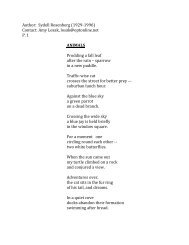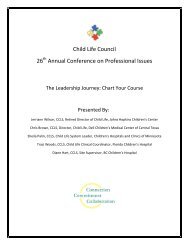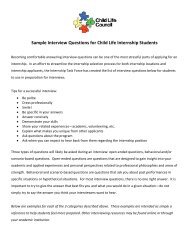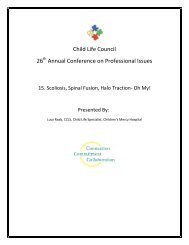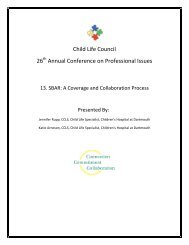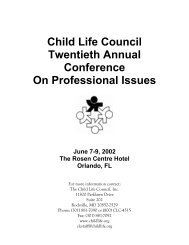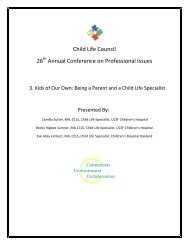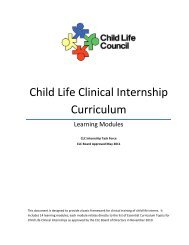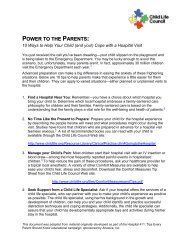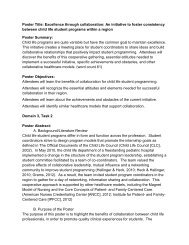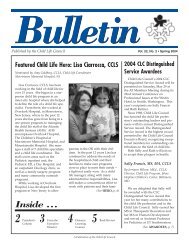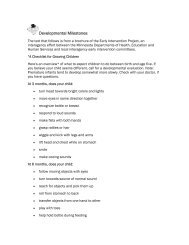Let YourStar Shine Bright... Let Your Star Shine ... - Child Life Council
Let YourStar Shine Bright... Let Your Star Shine ... - Child Life Council
Let YourStar Shine Bright... Let Your Star Shine ... - Child Life Council
- No tags were found...
You also want an ePaper? Increase the reach of your titles
YUMPU automatically turns print PDFs into web optimized ePapers that Google loves.
<strong>Let</strong> <strong>Your</strong> <strong>Star</strong> <strong>Shine</strong> <strong>Bright</strong>... DEEP IN THE HEART OF TEXAS!FRIDAY1:45 p.m. – 3:45 p.m. TWO-HOUR PROFESSIONAL DEVELOPMENTSEMINARS1. Healing the Hurting <strong>Child</strong>: The Necessary Dimensions of<strong>Child</strong>-Centered Play TherapyGarry L. Landreth, PhDRegents Professor, Department of Counseling, Development & HigherEducation, University of North Texas, Denton, TXStandard: 3Level: EntryThis presentation will focus on structuring the relationship in the hospital playroom,“reading” themes in children’s play, the language of facilitating adjustmentin children, returning responsibility for self-direction to children in playtherapy, and the ACT model of therapeutic limit setting. Video excerpts of Dr.Landreth’s play therapy sessions will demonstrate the play therapy process.2. The Legacy of Leadership: Evidence-Based Practicesand <strong>Child</strong> <strong>Life</strong>Stephanie Hopkinson, MA, CCLS<strong>Child</strong> <strong>Life</strong> Specialist, Kaiser Permanente - Los Angeles, Los Angeles, CASenta Greene, MA, CCLSCEO and Lead Consultant, Full Circle: A Professional Consulting Agency,Northridge, CAStandard: 2, 3, 4, 6Level: AdvancedBack by popular demand! This thought-provoking, interactive, and highlyengaging seminar will explore the concepts of effective leadership and allowparticipants the opportunity to participate in critically reflecting on their ownleadership styles, preferences, and abilities, using evidence-based practices as acore framework. Proven methods, theories, and frameworks will be explored inorder to support evidence-based practices in the areas of leadership.3. Development and AssessmentChris Puder, M Ed, CCLSProfessor, Department Head, University College of the Fraser Valley -Abbotsford Campus, Abbotsford, BCStandard: 3Level: EntryBack by popular demand! In order to support competence in providing developmentally-appropriatecare, this session will include a review of child developmentand related theories. The child life assessment process - designed to determineand prioritize the needs and scope of child life interventions - is also included.4. Behavioral Approaches to Comfort and Pain:Influencing an Infant’s FutureTracy Pipes, MS, CCLS<strong>Child</strong> <strong>Life</strong> Specialist, andDebbie Gearner Thompson, MS, CNS, PNP-BCNeonatal Clinical Nurse Specialist, <strong>Child</strong>ren’s Medical Center Dallas, Dallas, TXStandard: 3, 7Level: IntermediateThis presentation will focus on the multi-faceted approach to newborn andinfant pain management. Participants will identify, discuss and evaluate currentconcepts of procedural pain management, research regarding repetitivepain, behavioral modalities focused on minimizing or preventing pain, andtherapies to alleviate or minimize recurrent or chronic pain.5. Taking Emergency Care to the Next LevelLinsey Hammon, BS, CCLS, CPST<strong>Child</strong> <strong>Life</strong> Specialist, Cook <strong>Child</strong>ren’s Medical Center, Fort Worth, TXAnna Eckhardt, BA, CCLS, CIMI<strong>Child</strong> <strong>Life</strong> Specialist, Kravis <strong>Child</strong>ren’s at Mount Sinai Medical Center,New York, NYErin Stanley, BS, CCLS<strong>Child</strong> <strong>Life</strong> Specialist, WakeMed Hospital, Raleigh, NCKarin Rourke, MS, CCLS<strong>Child</strong> <strong>Life</strong> Specialist, Bronson Hospital, Kalamazoo, MIStandard: 3, 6, 7Level: IntermediateDon’t you ever just want to talk about your joys, challenges, excitements, andfrustrations concerning your role in the Emergency Department? This paneldiscussion is designed to give you the opportunity to learn from those who havebeen successful and seek solutions and support for your Emergency Departmentdilemmas.6. Patient- and Family-Centered Care:Does <strong>Your</strong> Practice Measure Up?Sheila Palm, MA, CCLS<strong>Child</strong> <strong>Life</strong> System Leader,<strong>Child</strong>ren’s Hospitals Clinics of Minnesota, Minneapolis, MNEllen Hollon, MS, CCLSDirector of <strong>Child</strong> <strong>Life</strong>/<strong>Child</strong> Development,<strong>Child</strong>ren’s Medical Center Dallas, Dallas, TXStandard: 1 through 10Level: IntermediatePatient- and Family-Centered Care (PFCC) is a phrase referenced in many organizationalmission and vision statements, yet often not fully embraced in caredelivery. An interactive process leads attendees to examine PFCC samples fromCL practice, and leave the workshop stimulated to implement knowledge gainedin their own work settings.4:00 p.m. – 5:30 p.m. PROFESSIONAL DEVELOPMENT WORKSHOPS7. W.A.R.M. Place Activities in a <strong>Child</strong> <strong>Life</strong> SettingPeggy BohmeExecutive Director, andKathy TelgerProgram Director, The WARM Place, Fort Worth, TXStandard: 3Level: Entry<strong>Child</strong> grief experts demonstrate activities helpful in a child-life setting: (1) legacy-buildingactivities that help dying children create their legacy and leave a giftfor family members; (2) expressive arts activities that help dying children andtheir families process their feelings; and (3) memorializing activities that helpchildren remember someone who has died.8. Tell Me About It — A Comparison of Stress and Copingfor <strong>Child</strong>ren with Cancer in the UK and USJudy Ann Holt Rollins, PhD, RNVice-President, Research & Consulting, Associate Editor,Rollins & Associates, Inc., Pediatric Nursing, Washington, DCStandard: 10Level: IntermediateAs research on children shifts from seeking information about children to seekinginformation from them, researchers require developmentally-appropriatemethods for children to communicate their experiences. This presentationdescribes an international study that used children’s drawings to compare stressand coping for children with cancer in the UK and US.9. Knock, Knock <strong>Let</strong> Us In: Asserting the <strong>Child</strong> <strong>Life</strong> Rolein the Trauma RoomCatherine Marshall, BS, CCLS, AA<strong>Child</strong> <strong>Life</strong> Specialist – Level III - Emergency Department, andMichelle Tartamosa, BA, CCLS<strong>Child</strong> <strong>Life</strong> Specialist – Level II – Emergency Department,The <strong>Child</strong>ren’s Hospital of Philadelphia, Philadelphia, PAStandard: 1, 3, 7Level: EntryWhat is child life’s role in the busy, often intimidating trauma room? An essentialone! This session will explore how to introduce or enhance child life servicesin the trauma room and achieve effective team collaboration to benefitpatients, families and staff.16 CHILD LIFE COUNCIL



